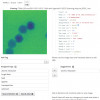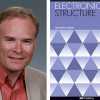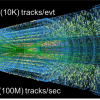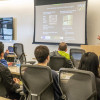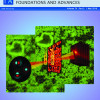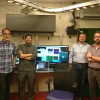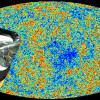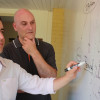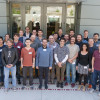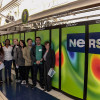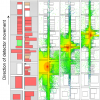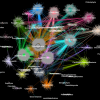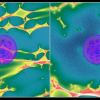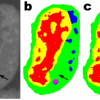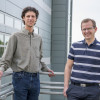News Center
Berkeley Researchers Use Machine Learning to Search Science Data
Science Search, a web-based search engine for scientific data is currently being developed by a team of researchers in Berkeley Lab's CRD and NERSC. The team is also developing innovative machine learning tools to pull contextual information from scientific datasets and automatically generate metadata tags for each file. As a proof-of-concept, the team is working with staff at the Molecular Foundry, to demonstrate the concepts of Science Search on the images captured by the facility's instruments. Read More »
De Jong Named Electronic Structure Editor-in-Chief
CRD Senior Scientist and Group Leader Bert de Jong was recently named a founding editor-in-chief for Electronic Structure, a new Institute of Physics scholarly journal. Read More »
CRD Post-doc Goes from Medical Devices to Mars Landing
Applied mathematician Mike MacNeil joined the Computational Research Division’s Analytics and Visualization group at Berkeley Lab as a postdoctoral researcher in August 2017, where he is working to develop new algorithms that improve scientists’ ability to shift through the image data sets they glean from experiments run at Berkeley Lab’s Advanced Light Source. Read More »
Physicists and Machine Learning Experts Team Up to Tackle the TrackML Challenge
Machine learning experts, computer scientists and physicists have partnered with Kaggle on the TrackML Particle Tracking Challenge, a competition designed to inspire the development of an algorithm that can quickly reconstruct particle tracks from 3D coordinates left in silicon particle detectors following millions of particle collisions. Read More »
Computing Sciences Summer Student Program Draws 90+ Participants
Dozens of college students from around the world will spend the next two months at Berkeley Lab as part of the Computing Sciences Summer Student Program. Read More »
New Algorithm Enhances Ptychographic Image Reconstruction
Researchers from CAMERA, the University of Texas and Tianjin Normal University—all members of the SHARP collaboration—have developed a model that further enhances SHARP’s reconstruction capabilities. Read More »
Berkeley Lab Paves the Way for Real-time Ptychographic Streaming
What began nearly a decade ago as a Berkeley Lab Laboratory-Directed Research and Development proposal is now a reality, and it is already changing the way scientists run experiments at the Advanced Light Source—and, eventually, other light sources across the Department of Energy complex—by enabling real-time streaming of ptychographic image data in a production environment. Read More »
Planck Collaboration Wins 2018 Gruber Cosmology Prize
The Planck Team—including researchers in Lawrence Berkeley National Laboratory’s (Berkeley Lab’s) Computational Research and Physics divisions—have been awarded the 2018 Gruber Cosmology Prize. Read More »
ACM’s Software System Award Honors Project Jupyter Team
The Project Jupyter team has been honored with an ACM Software System Award for developing a tool that has had a lasting influence on computing. Project Jupyter evolved from IPython, an effort pioneered by Fernando Pérez, a staff scientist in Berkeley Lab's CRD. Read More »
Berkeley Lab Hosts Neurodata Without Borders Hackathon
Thirty-one neuroscience experts from across the country came to Berkeley Lab last Thursday and Friday to participate in the fifth Neurodata Without Borders: Neurophysiology (NWB:N) project hackathon. Read More »
Berkeley Lab’s Julian Borrill Elected Co-Spokesperson of CMB-S4
Berkeley Lab’s Julian Borrill has been elected co-spokesperson for the CMB-S4 collaboration, the next-generation ground-based experiment to study the Cosmic Microwave Background. Read More »
Computational Research Division Hosts UC Merced Grad Students
On April 19, a group of PhD students from UC Merced, all participants in the National Science Foundation’s Interdisciplinary Computational Graduate Education program, visited Berkeley Lab to learn about the many ways computing can be applied to research problems. Read More »
Helen Cademartori Named CS Deputy for Operations
Helen Cademartori, is joining the Computing Sciences Area as Deputy for Operations and Operations Deputy for the CRD. In her new role, Cademartori will manage the CS Directorate's Business, Administration, Safety, Property and Information Technology staff.
Read More »
Berkeley Lab Researchers Develop Platform for Hosting Science Data Analytics Competitions
NNSA is hosting a competition to find innovative algorithms to detect non-natural radiation sources in urban environments, and they've teamed up with researchers in Berkeley Lab’s Computational Research, Nuclear Science and Information Technology divisions to build a Kaggle-inspired data analytics competition platform to host it. Read More »
Mueller’s Career Path a Blueprint for Other Researchers
Finding a career can be an exciting and sometimes challenging time in one’s life. It involves being noticed by your peers and making connections to find people to work with. This can be intimidating for some but comes naturally to others, like researcher Juliane Mueller. Read More »
COSMIC Impact: Next-Gen X-ray Microscopy Platform Now Operational
With help from Berkeley Lab’s Center for Advanced Mathematics for Energy Research Applications (CAMERA), the Advanced Light Source's new COSMIC (Coherent Scattering and Microscopy) beamline is specialized for studies of active chemistry and electronic properties at tiny scales. Read More »
A Game Changer: Metagenomic Clustering Powered by HPC
A team of researchers from Berkeley Lab's CRD and JGI took one of the most popular clustering approaches in modern biology—the Markov Clustering algorithm—and modified it to run quickly, efficiently and at scale on distributed-memory supercomputers. Read More »
Combination of Old and New Yields Novel Power Grid Cybersecurity Tool
An R&D project led by Berkeley Lab researchers that combines cybersecurity, machine learning algorithms and commercially available power system sensor technology to better protect the electric power grid has sparked interest from U.S. utilities, power companies and government officials. Read More »
Can Strongly Lensed Type Ia Supernovae Resolve One of Cosmology’s Biggest Controversies?
Using the SciDAC developed SEDONA code and NERSC supercomputers, astrophysicists at Berkeley Lab and the University of Portsmouth discovered how to control the effects of "micolensing." Armed with this knowledge they believe they will be able to find 1000 strongly lensed Type Ia supernovae in real-time from LSST data--that's 20 times more than previous expectations. Read More »
Berkeley Lab “Minimalist Machine Learning” Algorithms Analyze Images from Very Little Data
Berkeley Lab mathematicians have developed a new approach to machine learning aimed at experimental imaging data. Rather than relying on the tens or hundreds of thousands of images used by typical machine learning methods, this new approach “learns” much more quickly and requires far fewer images. Read More »
Delivering Efficient Parallel I/O with HDF5 on Exascale Computing Systems
In an interview with Department of Energy's ECP communications team, Berkeley Lab's Suren Byna and Quincey Koziol talk about delivering efficient parallel I/O with HDF5 on exascale computing systems. Read More »
Berkeley Lab Researchers Contribute to Making Blockchains Even More Robust
In the last few years, researchers at Berkeley Lab, UC Davis and University of Stavanger in Norway have developed a new protocol, called BChain, which makes private blockchain even more robust. The researchers are also working with colleagues at Berkeley Lab and beyond to adapt this tool to support applications that are of strategic importance to the Department of Energy’s Office of Science. Read More »
Berkeley Lab’s ArrayUDF Tool Turns Large-scale Scientific Array Data Analysis Into a Cakewalk
A novel scalable framework developed by CRD researchers is improving scientific productivity by allowing researchers to run user-defined custom analysis operations on large arrays of data with massively parallel supercomputers, while leaving complex data management and performance optimization tasks up to the underlying system. Read More »









